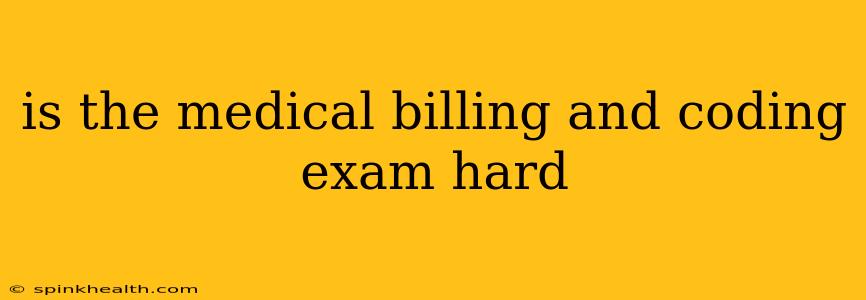Is the Medical Billing and Coding Exam Hard? A Story of Preparation and Perseverance
The question hangs in the air, a whispered anxiety amongst aspiring medical billing and coding professionals: Is the exam hard? The answer, like most things in life, is nuanced. It's not simply a "yes" or "no," but a story shaped by preparation, dedication, and the individual's learning style.
My journey into the world of medical billing and coding began with a similar apprehension. I’d heard tales of grueling study sessions, nail-biting exam days, and the sheer volume of information to absorb. The prospect felt daunting, a mountain I wasn't sure I could climb. But armed with a healthy dose of determination and a strategic approach, I discovered that while challenging, conquering the exam was entirely achievable.
What Makes the Medical Billing and Coding Exam Challenging?
The exam's difficulty stems from several factors:
-
Vast Subject Matter: The sheer breadth of knowledge required is significant. From understanding intricate medical terminology and procedures to mastering complex coding systems like ICD-10-CM and CPT, the learning curve is steep. You're not just memorizing; you need to understand the underlying logic and application of each code.
-
Precision and Detail: A single misplaced digit or incorrect code can have significant financial consequences. The exam tests your ability to pay meticulous attention to detail, ensuring accuracy in every step of the billing process.
-
Time Constraints: You're working against the clock during the exam. Efficiently navigating the questions and applying your knowledge under pressure is crucial. This requires practice and familiarity with the exam format.
-
Constant Updates: Medical coding and billing systems are constantly evolving. New codes are added, and existing ones are modified. Staying current with these changes is essential for both the exam and a successful career in the field.
How Can I Prepare for the Medical Billing and Coding Exam?
This is where the story shifts from apprehension to action. My success wasn't about inherent aptitude, but about a structured preparation strategy.
1. Structured Study Plan: A well-defined study plan is your roadmap to success. Break down the material into manageable chunks, allocate sufficient time for each section, and schedule regular review sessions. Don't try to cram everything in at the last minute.
2. High-Quality Study Materials: Invest in reputable study guides, practice exams, and online resources. These will provide you with a comprehensive understanding of the subject matter and give you valuable practice answering exam-style questions.
3. Practice, Practice, Practice: This cannot be overstated. The more practice exams you take, the more comfortable you'll become with the format and the types of questions asked. Identify your weaknesses and focus on improving those areas.
4. Understanding, Not Just Memorization: Focus on understanding the why behind the codes, not just the what. This deeper understanding will make it easier to apply your knowledge to diverse scenarios.
5. Seek Support: Don't hesitate to seek help when needed. Join study groups, connect with mentors, or utilize online forums to discuss challenging concepts and share experiences.
What are the most common mistakes made during the exam?
Many candidates fall prey to rushing through questions, leading to careless errors. Thoroughly reviewing each question and double-checking your answers is crucial. Another common pitfall is inadequate preparation, underestimating the depth and breadth of the material.
What resources are available to help me study for the exam?
Numerous resources are available, including textbooks, online courses, practice exams, and professional organizations offering certification preparation programs.
Is there a time limit on the exam?
Yes, there is a time limit, emphasizing the need for efficient time management and practice under timed conditions.
In conclusion, is the medical billing and coding exam hard? Yes, it demands significant effort and dedication. But with a strategic approach, consistent study habits, and the right resources, conquering the exam becomes a tangible goal. My journey proved it—and yours can too. It’s not about innate ability; it's about the story you write through your preparation and perseverance.

